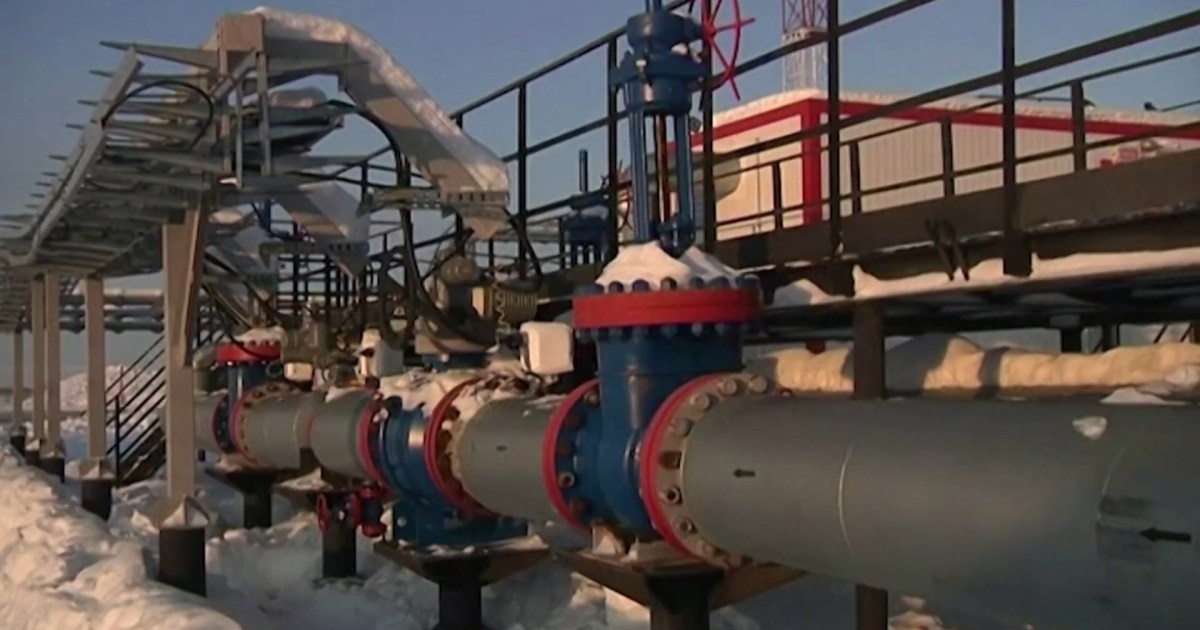Two sources familiar with the matter told Reuters that the administration of US President Joe Biden is ready to move forward with imposing a ban on oil imports from Russia to the United States without the participation of its allies in Europe.
This comes at a time when Germany stressed the exclusion of the energy sector from sanctions against Russia.
Biden is expected to hold a video conference with the leaders of France, Germany and the United Kingdom on Monday, as his administration continues to seek to support a ban on those imports.
A senior US official told Reuters that no final decision had been made, but "it is likely that if it happens it will be limited to the United States."
Oil prices jumped to their highest levels since 2008 above $130 a barrel due to delays in the possible return of Iranian crude to global markets while the United States and its European allies are considering banning Russian imports.
Europe relies heavily on Russia for crude oil and natural gas, but has become more open to the idea of banning Russian products.
The United States relies much less on crude and oil products from Russia, but a ban would help push prices higher and hurt American consumers who are already struggling with historically high prices at gas stations.
In America, too, prominent lawmakers announced, today, Monday, a plan to legislate a ban on the import of energy products from Russia and the suspension of normal trade relations with it, according to a statement from the group representing the Democratic and Republican parties.
"Taking these measures will send a clear message to (Russian President Vladimir) Putin that his war is unacceptable and that the United States stands firmly with our NATO allies," the lawmakers said.
Impact on Putin's financing of his war against Ukraine
But the American Wall Street Journal said in its editorial that the sudden scramble for politicians in Washington to ban the United States from buying Russian oil - a move that the administration of President Joe Biden is likely to react to - is unfortunately only a somewhat "symbolic gesture". Kabir ignores the main issue, which is whether sanctions should be imposed on all Russian energy exports.
The newspaper asserts that oil and gas revenues constitute about half of the Kremlin’s budget and are necessary to finance Vladimir Putin’s war on Ukraine, but the problem is that sanctions on the Russian energy sector could harm the global economy, especially Europe, which imports about 25% of its oil and 40% of its natural gas from Russia. .
The newspaper adds that unless the West is willing to take this bold step, the world will continue to fund Putin's war machine.
Germany rules out ban on Russian energy supplies
On the other hand, Germany ruled out on Monday a ban on energy imports from Russia despite plans by the United States and several European allies to tighten sanctions on Moscow in order to stop its military intervention in Ukraine.
German Chancellor Olaf Scholz said in a statement that there is currently no other way to secure energy supplies in Europe for various uses, such as heating, transportation, energy supply and industry.
He added that his country has been working with its partners inside and outside the European Union for months to develop alternatives to Russian energy, but this will not happen overnight.
Schultz renewed his country's support for economic and financial sanctions, but stressed the exclusion of the energy sector from Western sanctions.
Schultz said that energy from Russia is of fundamental importance to the daily lives of citizens.
"All our steps are designed in a way that hits Russia hard and is sustainable," he added.
An oil embargo may not work
For his part, the German foreign and finance ministers expressed their rejection of the imposition of a ban on gas, oil and coal imports from Russia as part of new sanctions related to the war on Ukraine.
"We must be able to continue (imposing sanctions) over time," German Foreign Minister Annalena Birbock told ARD.
She added that the imposition of sanctions would be "useless if, within 3 weeks, we find out that we have only a few days of electricity left in Germany and that we will have to reverse these sanctions."
Later, Birbock told ZDF channel, "We are ready to pay a very high economic price," but "if the lights go out tomorrow in Germany or in Europe, this will not stop the tanks."
These statements came in the wake of US Secretary of State Anthony Blinken confirming that they are in talks with European partners on banning the import of Russian oil to Western countries.
On February 24, Russia launched a military operation in Ukraine, which was followed by angry international reactions and the imposition of severe economic and financial sanctions on Moscow.
Russia warns of catastrophic consequences for the global market
In a Russian reaction, Deputy Prime Minister Alexander Novak said today that oil prices may jump above $300 a barrel if Washington and Europe ban crude imports from Russia.
"It is absolutely clear that the rejection of Russian oil will lead to catastrophic consequences for the global market," Novak said in a video statement broadcast by Russian television.
The Russian Deputy Prime Minister also said that his country may cut off gas supplies through the pipeline "Nord Stream 1" to Germany, but it has not yet taken such
a decision.

